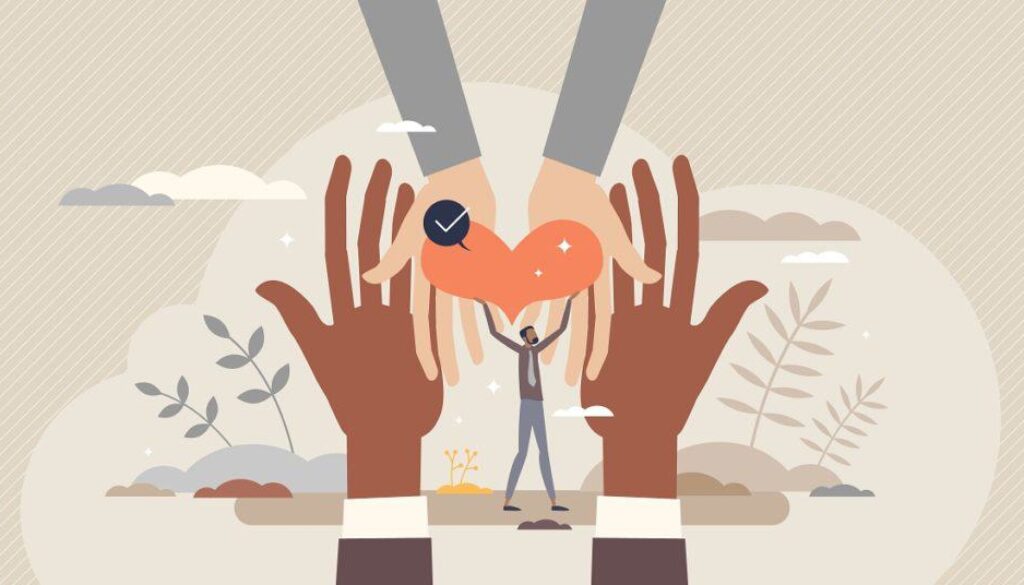The Complete Guide on How to be More Empathetic
By Hannah Levine
Contributed to MGI blog by bettertools.io
Do you ever find yourself lost for words when someone shares something important with you? Maybe you even find yourself scratching your head over other people’s feelings and thinking to yourself, “Why did they react like that?” You might need a crash course in empathizing.
Empathy is a skill that helps us understand others and react sensitively. It eases communication, helps us handle tough interpersonal situations, and means we can have closer, healthier relationships with our friends, family, co-workers and partners.
This guide breaks down exactly what empathy is and gives you practical advice on how to be more empathetic and become a glowing beacon of warmth and understanding, issuing out agony-aunt level support to your loved ones. Read on to start your journey to a more empathetic and caring you.
What is empathy?
Empathy comes from the Greek word ‘pathos’, which translates to ‘feelings’. ‘Em’ means ‘in’ and so, taken together, empathy means ‘in feelings’.
The modern take? Empathy is when someone else’s feels hit you right in your feels. Empathy is about understanding and feeling the emotions of others, be it people, our furry pals, or even TV characters. When it comes to emotional intelligence, it’s the cherry on the cake. This special ability to connect ourselves to others through emotion is what defines us. It drives our growth and creates deeper, truer connections with those around us. It’s been crucial to our survival, too, as humans are, at their very core, social creatures.
Understanding others
Most people think of empathy as understanding others, actively taking an interest, and listening to their concerns. But empathy is a bit more than this. It’s also about tuning into emotional cues, listening well, paying close attention to body language, being sensitive to different perspectives, and the ability to help others even if they’re different from you. The good news is that it’s not a question of being born more empathetic. Long gone are the outdated theories of left-sided brains and right-sided brains, or that women are born naturally more empathetic. Research today shows that empathy is a skill that anyone can work on.
One reason people avoid empathy is that emotional intelligence can be pretty ouch-ey, especially when dealing with hard emotions. So for the sake of their mental health, some people prefer to not even go there. Other people are naturally high in empathy and find it hard to distinguish between their own emotions and the emotions of others. Understandably, they turn off their emotional antennae to avoid becoming overwhelmed. This is particularly common in emotionally heavy jobs, such as carers for people who have dementia or Alzheimer’s.
If any of the above resonates with you, it is key to remember that being empathetic and understanding isn’t about sacrificing your mental health for the sake of others. The adage “you can’t pour from an empty cup” applies – you have to take care of yourself before you can care for others.
Supporting others
Empathy means to support others. Life is no easy thing, and we all have our struggles. Having a friend to lend a supportive ear can make all the difference in tough times. The first step in supporting someone is to listen. Listening is about deeply hearing someone; understanding their body language, how they are holding themselves, their tone, and what they are saying. Not only are you collecting information, but you’re also taking their emotional temperature so that you know how to best support them.
What does that look like? Let’s take a romantic relationship as an example. If one partner was struggling with choosing between two jobs, an unsupportive* partner might jump in to give their opinion. Rather than listening to the other person and how they feel about the situation, they’d rush ahead to simply tackle the situation head-on and find a solution. An empathetic and supportive partner would focus on understanding their partner’s concerns and how they feel about both jobs. Rather than saying what they think the other person should do, they might reframe it as what they themselves would do. Importantly, they’d prioritize saying supportive things over the chance to voice their own opinion. It is important to remember that a great deal of support is listening, hearing, and understanding that others have different perspectives.
Caring for others
Caring for others goes beyond just support and understanding. It’s when you genuinely want happiness for them and you value their happiness as a top priority in life. Caring is about understanding the happiness of others, and their other emotions too. To care means to know that no one is perfect and that we all only have a short time on this planet to discover what truly fulfils us. No two people share the same journey, but we can understand, support, and care for each other through our respective journeys. It’s about saying, ‘I understand that you are human, you experience emotions, and you are on your own journey. Like me, you want understanding, love, and happiness in your life.’
Types of Empathy
In his book ‘Emotional Intelligence’, Daniel Goldman identified three types of empathy – with compassionate empathy usually the most desirable. Certain types of empathy are more suitable for certain situations, and some people find it easier to express one type of empathy over another.
Cognitive Empathy
Cognitive empathy is often described as “simply knowing what someone feels and what they might be thinking, sometimes called perspective-taking”. By imagining yourself in someone else’s shoes, you can infer and understand how they might be feeling. However, having only cognitive empathy keeps you emotionally distanced from people, because you don’t necessarily share their feelings – this is where emotional empathy comes in.
Emotional Empathy
Emotional empathy is when “you feel physically along with the other person, as though their emotions were contagious”. It extends to physical feelings too, like wincing when someone hurts themself. Perhaps your friend is upset or crying, and you start to feel this way too. Emotional empathy can be feeling the same emotion as another person, feeling your own distress in a response to their pain, and feeling compassion for the other person.
Compassionate Empathy
Compassionate empathy is when “you not only understand a person’s predicament and feel with them but are spontaneously moved to help if needed”. It balances the best of cognitive and emotional empathy to support people without being overwhelmed with feelings or compelled to try and fix anything.
Why is empathy important?
Empathy might be a selfless skill, but it’s packed with self-interested benefits. We can personally benefit from being empathetic.
Empathy helps us to build stronger social connections with our friends, family, partners and co-workers, create meaningful emotional connections, understand and regulate our own emotions, promote healthy ‘helping’ behaviors’ that benefit our loved ones, lay the foundation for healthy socialization in children, and communicate our ideas better.
Good empathy skills are the building blocks of social connection, healthier and happy relationships, and successful communication.
Is everyone capable of empathy?
Empathy is more challenging for some than others. Some simply never learn the skills, especially if empathy was rarely expressed during their childhood.
Other people cannot empathize due to mental health disorders. People who have narcissistic personality disorder often lack empathy as a result. Similarly, as many would guess, psychopathy often also causes an inability to be empathetic. Both disorders are typically linked to early childhood trauma, either emotional or physical. These traumas can prevent the brain from understanding what empathy is as it develops. In cases like this, empathy can still be built with the help of a professional in the mental health field.
How to be more empathetic
Empathy isn’t a quality that you either possess or don’t. It’s a skill, made to be exercised and improved. It isn’t a singular thing either and, more often than not, empathy is in the act of doing.
1. Listen More:
Commit to the conversation and put away the devices (or anything else that might distract you). Make eye contact and take in their body language while they speak to understand how they feel. Give them space to talk and finish their thoughts without interruption. Rephase what they said, repeating it back to them to check you understood. You might just be pleasantly surprised by how much someone opens up to you when you give them your entire presence.
2. Be curious:
If you don’t know how someone else feels – ask! Use gentle, open-ended questions to better understand the other person’s perspectives, thoughts and feelings. Ensure that your questions are relevant, though, and non-judgmental. A part of this is to understand the person’s boundaries. By asking questions, you are informing the person that they have your undivided attention and that you are there for them, supporting them.
3. Voice how you would feel in the same situation:
You don’t need Virtual Reality to put yourself in someone else’s position. Just fire up your internal imagination hardware and picture it for a moment. How would you feel in their situation? Once you know the answer, sharing how you’d feel in the same situation is a great way to bond. It’s about being mutually vulnerable and showing your human side. If you have already experienced this situation, even better – you can both share, and maybe you even have some advice. But be sure not to make the conversation about yourself. Voice how you would feel and acknowledge the other person’s feelings at the same time. In this sense, you are walking in their shoes for a moment. In times of strife, nothing feels better than someone telling you that they think you are strong and acknowledging that the situation is not easy. This is both comforting and validates your emotions.
4. Be vulnerable:
When you share your feelings and connect with others, it’s a reminder that we are all human, and that we all have weaknesses, pains, and fears. In close relationships, mutual vulnerability is a strength. Its absence is a breeding ground for stress, tension, and all kinds of unwelcomed feels that will soon see the relationship crumble. Carefully listen to the person experiencing an issue and think of a time when you were in a similar situation – how did you feel? Express this to the other person and share what you learned. When we are vulnerable, sharing our insecurities and mistakes, we bond in our humanity, creating the foundation for a relationship. When you do this, you’ll find that the person will come to you with other issues or even to tell you about good things. A stronger bond grows between you.
5. Put yourself in others’ shoes:
You don’t have to be a mind-reader to understand why other people think or feel the way they do. You just need a little bit of time and imagination. Let’s say there’s a particularly bothersome person in your life. They seem mean, grumpy, or judgemental – and you dislike them for it. A great exercise in empathy is to take a sympathetic view of that person. Imagine all the reasons they might behave that way. What hardships might they face? What has happened in their life? Looking into a person’s life can help you better understand their thoughts, feelings, and actions. This doesn’t mean that you know the objective truth. But, rather, it’s a way to open yourself up to understanding more about them.
6. Get out into the world:
Don’t just put yourself in someone else’s shoes – take a walk in them. No matter how good your imagination is, you can’t fully understand someone else’s life just by picturing it. That’s called making assumptions, and those assumptions are heavily colored by our own lives and the biases we learn along the way. If there’s someone specific that you want to understand better, then take the time to experience their life. But you can also expand your empathy in the general sense by getting involved in different or diverse communities, experiencing different religions by visiting a mosque, synagogue, church, or another house of worship different from your own, spending time in another neighborhood or country and get to know how people live, and starting conversations with people who have very different lifestyles to you or even people who you usually avoid. Doing new things outside your comfort zone is a fast track to understanding more about other people’s perspectives. It is not just something exciting to do, but it can educate us about the world in which we live and help to teach us about other people and cultures, finally shedding that old exoskeleton of biases, prejudices, and assumptions that keep us guarded against the world.
7. Think about your biases:
One bad event, behavior or experience can cause us to tar a whole group of people with the same brush, sometimes subconsciously. It’s a natural protective behavior, but that doesn’t mean our beliefs are true, fair, or ethical. We have to recognize our biased shortcomings and work to overcome them. Biases are counterproductive to growth and empathy. Talking to those of whom you might usually have biases against can help you to grow past this, hear their stories, learn about them and their lives, and you may find that your biases were unequivocally wrong.
In summary, empathy is a super skill that will enhance your life. It makes for better relationships; with lovers, family, friends, work colleagues, and even strangers on the street. It makes our lives more beautiful and colorful; we can continue to enrich our view of the world with every new experience. We all want to be empathized with, and if we all learn to empathize with one another, no one’s needs will go unmet. If the world had more empathy in it, a great deal of the problems that plague the world today would no longer exist.
And if nothing else, consider this…
“Before you judge a man, walk a mile in his shoes. That way, when you do criticize him, you’ll be a mile away and have his shoes.”
Better Tools is a digital marketing site in the direct-to-consumer space and run a blog to create better humans, believing that better tools help us stay human in the digital era and empower us to find balance with our relationship to technology. Better Tools has digital wellness and digital minimalism at its heart; tools that make our lives easier and happier. Better tools are thoughtful by design, allowing you to make quality time for the things you love the most.
“Say bye to infinite scroll and brand burnout. Say hello to better tools. We curate the best direct-to-consumer brands who care for your well-being. We’re obsessed with feel-good brands who spark joy and make a difference. We believe in better and you deserve better”- Better Tools



